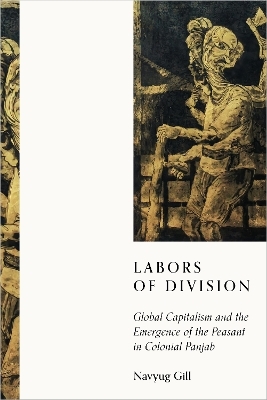
Labors of Division
Global Capitalism and the Emergence of the Peasant in Colonial Panjab
Seiten
2024
Stanford University Press (Verlag)
978-1-5036-3749-8 (ISBN)
Stanford University Press (Verlag)
978-1-5036-3749-8 (ISBN)
One of the most durable figures in modern history, the peasant has long been a site of intense intellectual and political debate. Yet underlying much of this literature is the assumption that peasants simply existed everywhere, a general if not generic group, traced backward from modernity to antiquity. Focused on the transformation of Panjab during the nineteenth and early twentieth centuries, this book accounts for the colonial origins of global capitalism through a radical history of the concept of "the peasant," demonstrating how seemingly fixed hierarchies were in fact produced, legitimized, and challenged within the preeminent agricultural region of South Asia. Navyug Gill uncovers how and why British officials and ascendant Panjabis disrupted existing forms of identity and occupation to generate a new agrarian order in the countryside. The notion of the hereditary caste peasant engaged in timeless cultivation thus emerged, paradoxically, as a result of a dramatic series of conceptual, juridical, and monetary divisions.
Far from archaic relics, this book ultimately reveals both the landowning peasant and landless laborer to be novel political subjects forged through the encounter between colonialism and struggles over culture and capital within Panjabi society. Questions of progress, exploitation and knowledge come to animate the vernacular operations of power. With this history, Gill brings difference and contingency to understandings of the global past in order to re-think the itinerary of comparative political economy as well as alternative possibilities for emancipatory futures.
Far from archaic relics, this book ultimately reveals both the landowning peasant and landless laborer to be novel political subjects forged through the encounter between colonialism and struggles over culture and capital within Panjabi society. Questions of progress, exploitation and knowledge come to animate the vernacular operations of power. With this history, Gill brings difference and contingency to understandings of the global past in order to re-think the itinerary of comparative political economy as well as alternative possibilities for emancipatory futures.
Navyug Gill is Associate Professor of History at William Paterson University.
List of Illustrations
Acknowledgments
Introduction In Pursuit of Peasant Histories and Futures in Colonial Panjab
1. A Rule of Benevolence? Revenue, Knowledge, and the Accumulation of Difference
2. Naming the Peasant: Colonial Jurisprudence and the Binding of Identity and Occupation
3. The Logic and Illogic of Debt: Reason and Capitalist Volatility in the New Agrarian Market
4. Horizons of Hierarchy: Caste, Landlessness, and the Limits of Religious Conversion
5. Producing a Theory of Inadequacy: Adam Smith, Karl Marx, and the Political Economy of Comparison
Conclusion: Global History and the Impermanence of Hierarchy
Notes
Bibliography
Index
| Erscheinungsdatum | 19.12.2023 |
|---|---|
| Reihe/Serie | South Asia in Motion |
| Zusatzinfo | 1 table, 10 halftones, 2 maps |
| Verlagsort | Palo Alto |
| Sprache | englisch |
| Maße | 152 x 229 mm |
| Themenwelt | Geschichte ► Allgemeine Geschichte ► Neuzeit (bis 1918) |
| Geisteswissenschaften ► Geschichte ► Regional- / Ländergeschichte | |
| Sozialwissenschaften ► Soziologie ► Makrosoziologie | |
| ISBN-10 | 1-5036-3749-2 / 1503637492 |
| ISBN-13 | 978-1-5036-3749-8 / 9781503637498 |
| Zustand | Neuware |
| Haben Sie eine Frage zum Produkt? |
Mehr entdecken
aus dem Bereich
aus dem Bereich
Europa 1848/49 und der Kampf für eine neue Welt
Buch | Hardcover (2023)
DVA (Verlag)
48,00 €
Giordano Bruno - ein ketzerisches Leben
Buch | Hardcover (2024)
C.H.Beck (Verlag)
29,90 €


